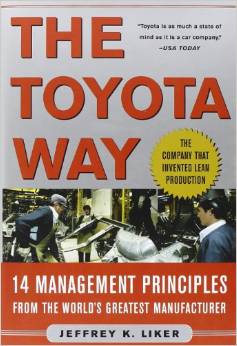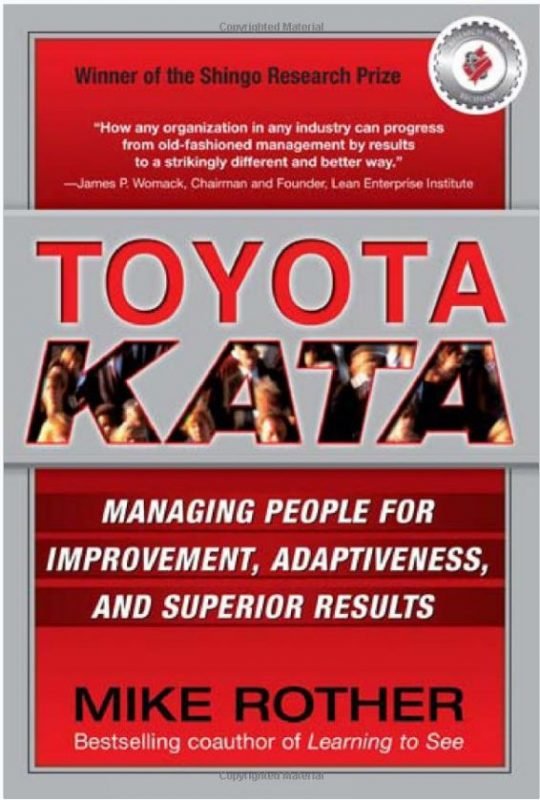The Toyota Way: 14 Management Principles from the World’s Greatest Manufacturer
How to speed up business processes, improve quality, and cut costs in any industry
In factories around the world, Toyota consistently makes the highest-quality cars with the fewest defects of any competing manufacturer, while using fewer man-hours, less on-hand inventory, and half the floor space of its competitors. The Toyota Way is the first book for a general audience that explains the management principles and business philosophy behind Toyota's worldwide reputation for quality and reliability.
Complete with profiles of organizations that have successfully adopted Toyota's principles, this book shows managers in every industry how to improve business processes by:
Eliminating wasted time and resources
Building quality into workplace systems
Finding low-cost but reliable alternatives to expensive new technology
Producing in small quantities
Turning every employee into a qualitycontrol inspector
The Toyota Way to Continuous Improvement: Linking Strategy and Operational Excellence to Achieve Superior Performance
Building upon the international bestselling Toyota Way series of books by Jeffrey Liker, The Toyota Way to Continuous Improvement looks critically at lean deployments and identifies the root causes of why most of them fail. The book is organized into three major sections outlining:
1) Why it is critical to go beyond implementing lean tools and, instead, build a culture of continuous improvement that connects operational excellence to business strategy
2) Case studies from seven unique industries written from the perspective of the sensei (teacher) who led the lean transformation
3) Lessons about transforming your own vision of an ideal organization into reality
Lean Six Sigma for Service : How to Use Lean Speed and Six Sigma Quality to Improve Services and Transactions
Bring the miracle of Lean Six Sigma improvement out of manufacturing and into services
Much of the U.S. economy is now based on services rather than manufacturing. Yet the majority of books on Six Sigma and Lean--today's major quality improvement initiatives--explain only how to implement these techniques in a manufacturing environment.
Lean Six Sigma for Services fills the need for a service-based approach, explaining how companies of all types can cost-effectively translate manufacturing-oriented Lean Six Sigma tools into the service delivery process.
Filled with case studies detailing dramatic service improvements in organizations from Lockheed Martin to Stanford University Hospital, this bottom-line book provides executives and managers with the knowledge they need to:
Reduce service costs by 30 to 60 percent
Improve service delivery time by 50 percent
Expand capacity by 20 percent without adding staff
Lean Six Sigma Pocket Toolbook
The Lean Six Sigma Pocket Toolbook blends Lean and Six Sigma tools and concepts, providing expert advice on how to determine which tool within a "family" is best for different purposes. Packed with detailed examples and step-bystep instructions, it's the ideal handy reference guide to help Green and Black Belts make the transition from the classroom to the field.
- Features brief summaries and examples of the 70 most important tools in Lean Six Sigma, such as "Pull," "Heijunka," and "Control Charts"
- Groups tools by purpose and usage
- Offers a quick, easy reference on using the DMAIC improvement cycle
- Provides comprehensive coverage in a compact, portable format
Sales and Marketing the Six Sigma Way
Quality management. Process mapping. Speed to production. In the past 50 years, a rigorous, measurement-based methodology called Six Sigma has brought production management to previously unimaginable levels of success and sophistication. Top corporations such as Motorola and GE have built their reputations, products, and revenues using this approach. Indeed, Six Sigma has found widespread application in every significant industry and business—except marketing and sales. In Sales and Marketing the Six Sigma Way, sales and quality guru Michael Webb shows how to blend marketing and sales efforts with the cutting-edge methods of Six Sigma to boost their bottom lines. With Webb’s book as a guide, readers learn to engineer rapid routes to customer value, accurately predict future revenue, and ensure return on investment for their projects. In Sales and Marketing the Six Sigma Way, you will: * Find out why "the usual fixes" for sales problems don't work * Meet executives who have used Six Sigma to imrpove marketing and sales results * See the pitfalls that await the unwary when applying process improvement in sales * Learn how to introduce Six Sigma to sales and marketing professionals * Discover through examples and cases how to manage sales as a process Webb walks readers through several Six Sigma sales and marketing projects from start to finish, highlighting the tools, decisions, and results that made them successful. He shows the practical methods managers use to translate process improvement principles to the human world of selling and marketing. With his dual background in sales and marketing management and in quality improvement, Webb speaks clearly to readers in both disciplines. This makes Sales and Marketing the Six Sigma Way,the indispensible guide for sales and marketing professionals who want to excel in today's business environment, and for quality improvement experts who want to help them.
More info →Toyota Kata: Managing People for Improvement, Adaptiveness and Superior Results
"Toyota Kata gets to the essence of how Toyota manages continuous improvement and human ingenuity, through its improvement kata and coaching kata. Mike Rother explains why typical companies fail to understand the core of lean and make limited progress―and what it takes to make it a real part of your culture."
―Jeffrey K. Liker, bestselling author of The Toyota Way
"[Toyota Kata is] one of the stepping stones that will usher in a new era of management thinking."
―The Systems Thinker
"How any organization in any industry can progress from old-fashioned management by results to a strikingly different and better way."
―James P. Womack, Chairman and Founder, Lean Enterprise Institute
"Practicing the improvement kata is perhaps the best way we've found so far for actualizing PDCA in an organization."
―John Shook, Chairman and CEO, Lean Enterprise Institute









